Unless you’re going to use your RV all year round, eventually, you’ll need to store it.
When searching for the right storage for your RV, there are two things that can get heavy on the wallet. First of all, not all RV storage facilities come at reasonable prices.
Secondly, you need to prep your motorhome before storage so that it won’t greet you with costly damages once the next camping season begins.
When looking around the web, you’ll likely find all kinds of tips. So today, I’ve gathered the most useful money-saving tips when it comes to storing your RV. But before we get started on that, let’s explore your storage choices.
Storage Options For RVs
Any place that offers some protection from the elements will pretty much do when it comes to storing your RV.
That said, you still want security at a reasonable price. So, what are the alternatives?
At-Home Storage
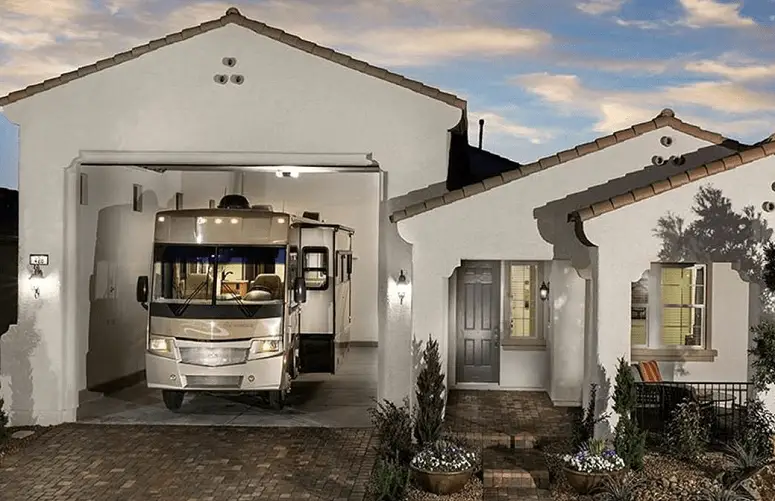
The ideal location for storing your beloved RV would, of course, be your own backyard or driveway.
Here, you can check on your motorhome any time you want, and you’ll save some money on facility fees.
That said, be aware that you will need to take some measures to protect your RV. Many owners opt for installing a carport or awning to cover their motorhome or trailer and protect it from rain damage.
But if you live in a state where you experience harsher weather conditions, it may be better to store the RV in an enclosed structure.
RVs tend to suffer wear and tear over winter (even when they are kept in off-season storage). This is because they go through wind, frost, sunshine, and rain. The elements can do significant damage.
If you have a large garage or barn, this would be ideal and save you a lot of money in the long run.
If you live in a milder state, you could park it in your driveway or side yard.
However, make sure you check with your local municipality legislation, it could be that they have some storage restrictions.
Even though these are usually only enforced when a neighbor complains, it’s a good idea to take note of all their regulations and boundaries. Then make sure you follow it, to avoid annoying a neighbor and incurring a fine.
Some communities are members of the Homeowner Association (HOA). I can’t speak for all, but from what I’ve heard and learned, most allow you to park your RV as long as it can’t be seen from the street.
RV Facility Storage
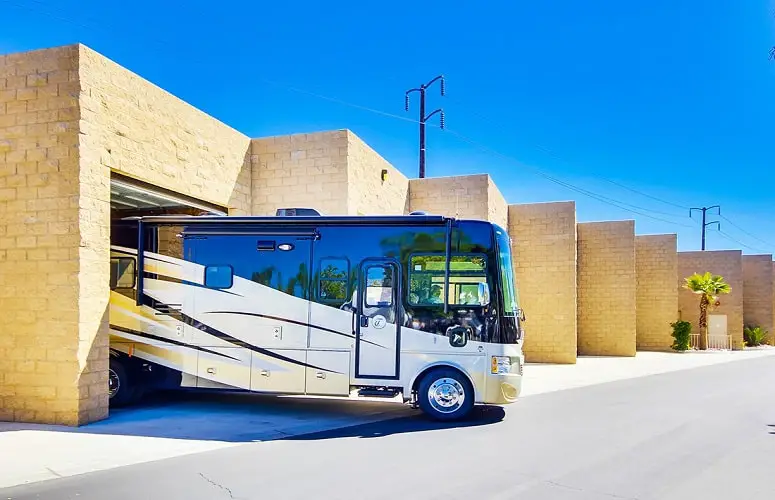
If you are like most RV owners and don’t have enough space to park your RV at home, an outside facility is your only real choice.
The best thing to do, if you want to save money, is to call around to different facilities, ideally those located nearby.
A pro tip would be to find those that are closer to a highway or an interstate. RV storage facilities located in larger cities or towns are usually more pricey than those in rural areas.
In saying this, don’t just opt for the cheapest location and settle with that. Look for useful extras, such as video surveillance, security gates, and covered parking options.
Of course, covered parking options are generally more pricey, but for this, I would say it’s best to spend a little more.
Additionally, be sure that you are aware of all the restrictions for when you want to access your RV.
Some of these storage facilities ask you to pay by the length of your RV. For example, perhaps they will charge you $1.00 per foot.
This is also why it’s smart to ask different facilities for an in-depth quote, so you can get the best price without hidden extras. Keep track of everything while you search.
Pro tip: To save extra cash on storage, ask the facility if they offer a discount if you pay for several months in advance, or by monthly direct debit payments.
Friendly Neighbor
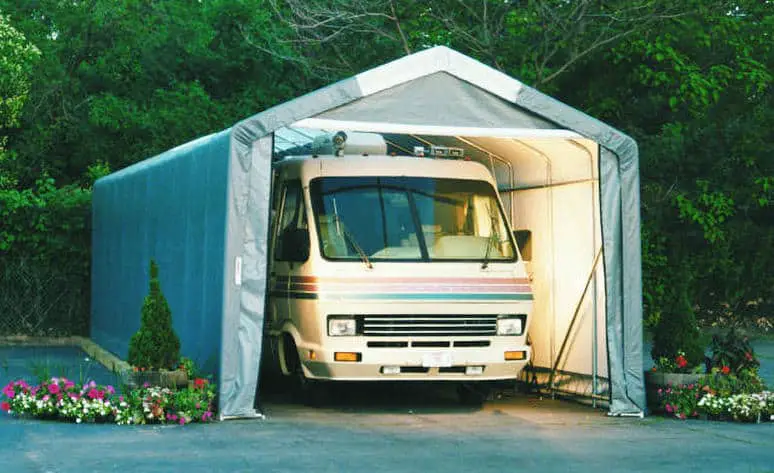
Some folks are lucky enough to have a friendly neighbor, or a relative, who has enough room to spare where you to store your RV.
In these cases, it’s a good idea to offer some sort of rent or another kind gesture, in return for the used space. This does, of course, depend on your relationship. Some may even be so lucky that they get to store it for free.
RV Storage Money-Saving Tips
Now that we’ve explored the storage options, it’s time to get into some money-saving details. Below I’ve included 14 tips for you.
#1 Scrub And Vacuum The Interior
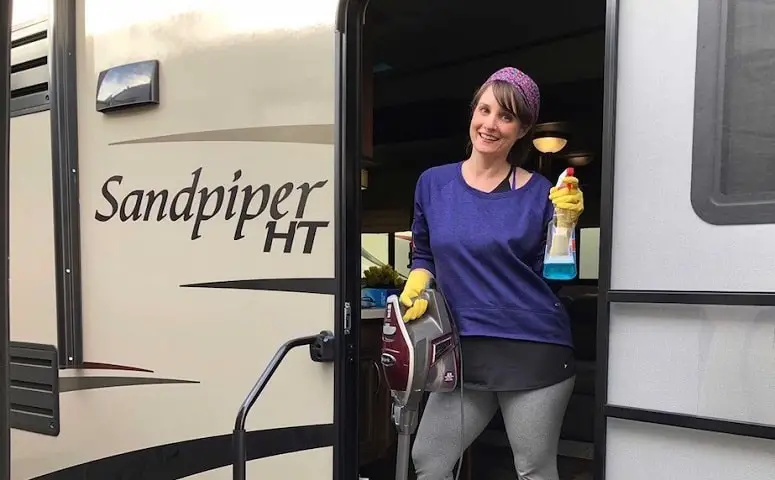
What would be one of the worst-case scenarios when returning to your RV, ready for a trip with your friends and family?
A camper ruined by pests, of course. Unfortunately, rodents are some of the most common unwanted RV guests.
Pests carry diseases, you never know where they last had their tiny feet. Having cockroaches roam your kitchen countertops is not what you want to return to.
Apart from potential disease, pests also emit strong odors that can be hard to get rid of.
Therefore, before you leave your RV in the storage facility, make sure that you scrub, wash, and vacuum the interior well. Even though you secured, closed and locked your RV, rodents, cockroaches and more can still enter.
These pesky creatures can crawl through the smallest cracks and crevices and, unfortunately, your RV is probably their ideal winter home. Especially if they can find tasty morsels in the nooks and crannies.
Make sure you leave no crumbs behind and save yourself a couple of hundred dollars by avoiding having to call the pest control services. Or having to repair the interior.
#2 Empty The Cabinets
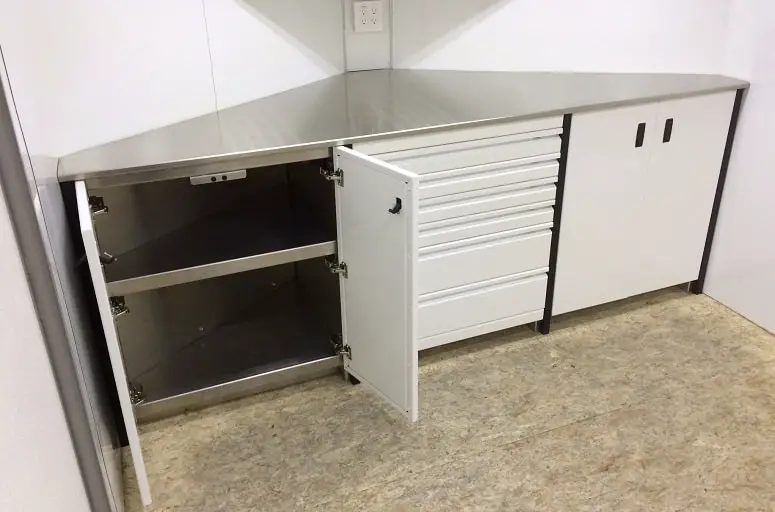
This partially relates to the pests problem above. Leaving packages of food in your cabinets will also attract pests.
Although they’re sealed off, rodents can still chew through and leave your RV in a horrendous state for your return.
Make sure that you go through every cabinet and pantry and take out all of the items. Some items such as cookies or boxed food may contain moisture and become moldy after a while. This can spread through your RV.
This also goes for other items, such as toothpaste, deodorant, and shampoos. These won’t go moldy, but if you store your RV during the warmer months, they could go “off,” due to the heat.
Save some money and take everything home with you.
#3 Clean The Refrigerator
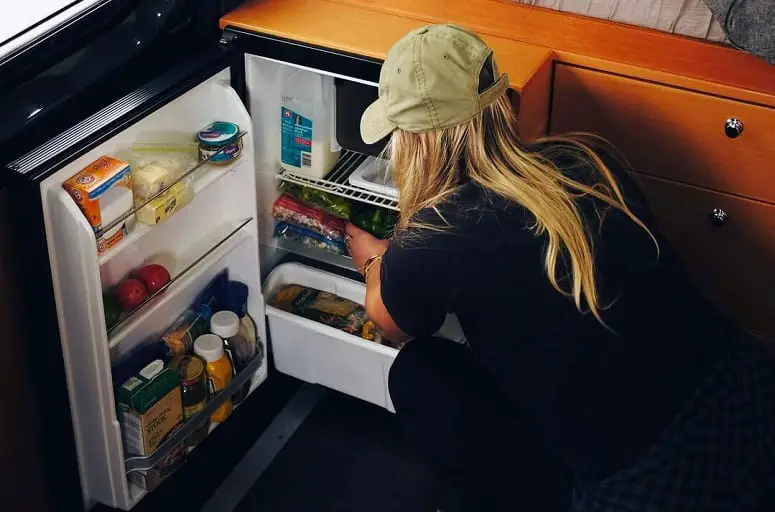
Begin by removing everything inside both the refrigerator and freezer.
While your RV is in storage, all your appliances will be off, so leaving food behind, or even food residue, is just asking for a moldy fridge.
Additionally, be sure that you defrost your freezer and give every shelf a thorough clean. Before you go, leave the refrigerator door ajar.
Pro tip: Leave an open package of baking soda in the refrigerator or freezer. This will help to eliminate any unwanted odors and means you’ll return to a fresh, odorless fridge ready for your next adventure.
#4 Close Vents, Windows, And Blinds
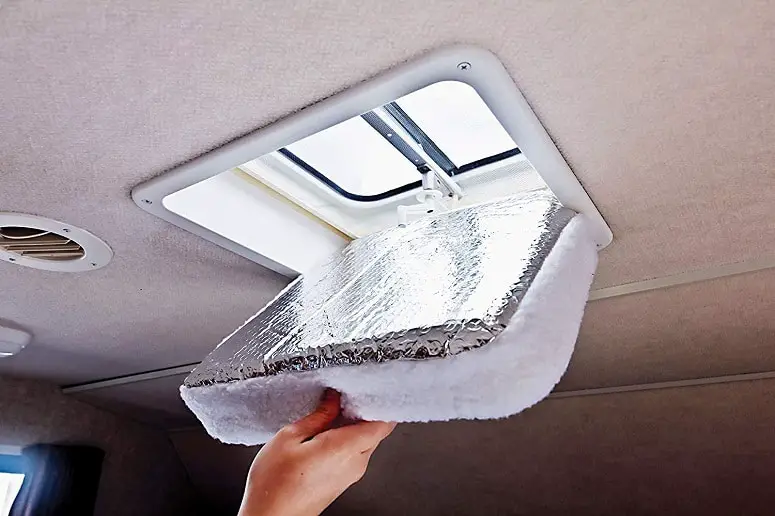
This might be pretty obvious, but remember to close all the vents, windows, and doors securely. Leaving even the smallest crack open is an invitation to pests, dust, and other outside dangers.
If your RV isn’t covered, rain can quickly seep in and cause some highly unpleasant water damage. Not to mention the mold you would return to.
You should also keep the interior safe by closing all the curtains and blinds. The interior is prone to sun damage, even in winter, especially if you don’t have a cover on the RV.
The sun can bleach fabrics and cause them to perish. So needless to say, please cover up all the windows. It can get really expensive having to repair or even replace pieces of furniture.
#5 Save Your Battery
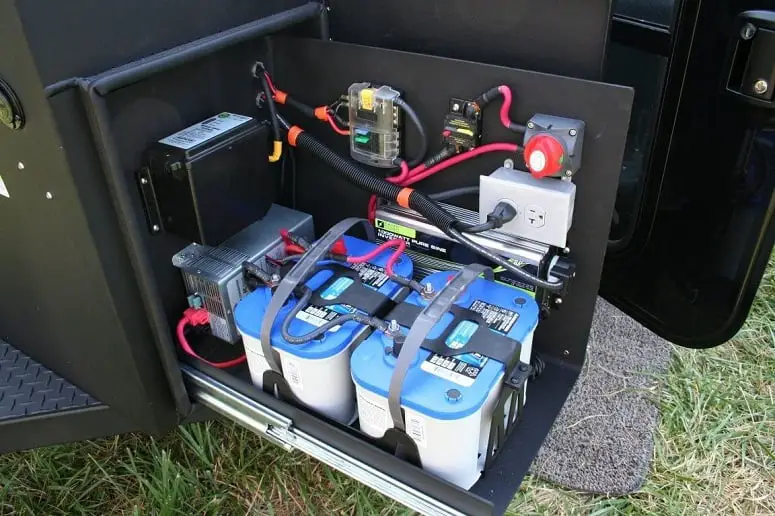
While you’re away, a good money-saving tip is to disconnect your utility battery.
This will not only reduce battery drain but also save your appliances.
To help you with this, many new RVs have a battery switch. This will shut down the battery completely with just the push of a button.
If yours doesn’t have a switch, simply remove the fuse. But remember to place it in a safe location that you will remember. Perhaps in a cabinet in your RV, or in your toolbox at home.
Do the same for the liquefied petroleum gas (LPG) supply. Switch it off or remove the fuse. Always remember to leave the valve in the OFF position.
Taking these simple steps will help you save money on a new battery.
#6 Winterize Your Water System
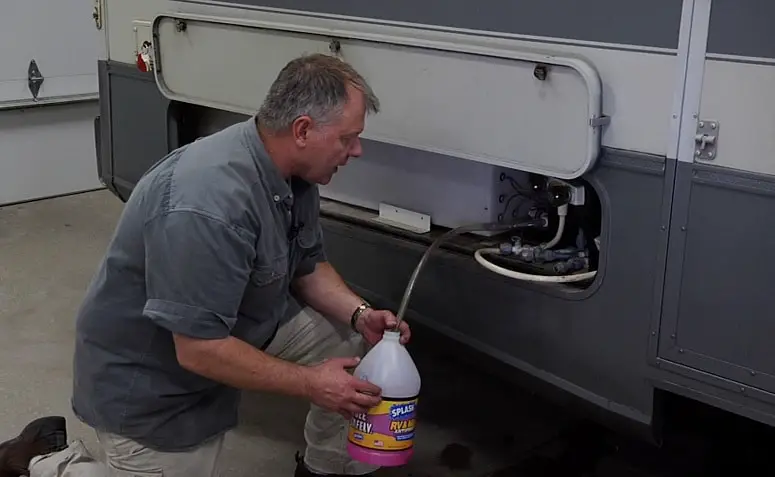
If you’re storing your RV over the winter, make sure that you winterize your onboard water system.
During the colder weather, the water inside could freeze and cause a break in the pipes. Before leaving your RV in the storage, look through your owner manual on how to prep for winter.
If you don’t want to do it yourself, take it down to your RV dealer and they should help you out.
#7 Clean And Dry The Exterior
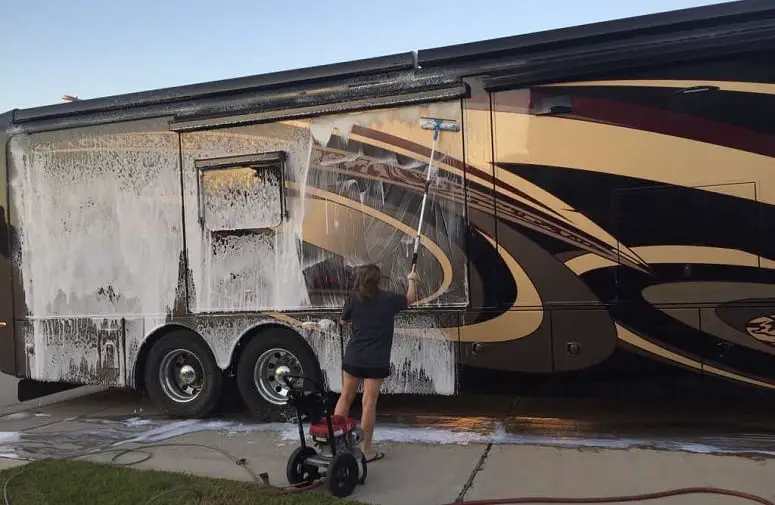
Keeping the exterior clean is just as important as the interior and will save you money in the long run.
Give everything a good wash and don’t leave any dirt behind. If you have an awning, make sure you clean that thoroughly, too.
A good tip is to start with the roof. This way you won’t have to clean everything twice as the dirty water runs down the sides.
After the wash, give your RV time to dry off completely. This is especially important for to prevent mold.
If you intend on placing a cover over your RV, trapped moisture can lead to mold and mildew, particularly on your awning, which is more vulnerable to this.
Avoid this by opening up the awning and leaving your RV in the sun for a couple of hours to dry.
When the RV is dry, you can give it a good waxing. Waxing the exterior will protect your paint from sun damage and help keep dirt build-ups at bay.
#8 Wash The Undercarriage
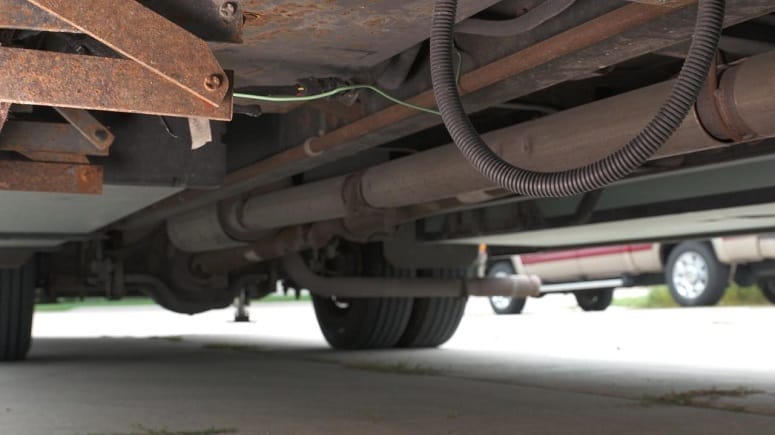
Do not forget the undercarriage.
Under your RV there are all sorts of chemicals, oils, and mineral deposits that could cause corrosion during long periods of storage.
My advice would be to bring your RV to a professional RV cleaner. These places know how to do a thorough job, and even though you’ll spend a little extra, it will save you in the long run.
While you are there, ask if they can fill out any gaps and holes. Or ask for advice on how to do this yourself. This will seal off any access for unwanted visitors such as rodents and will preserve vulnerable wires.
Pro tip: You can easily use silicone or expandable foam to fill in any small holes in the underbelly.
#9 Protect The Tires
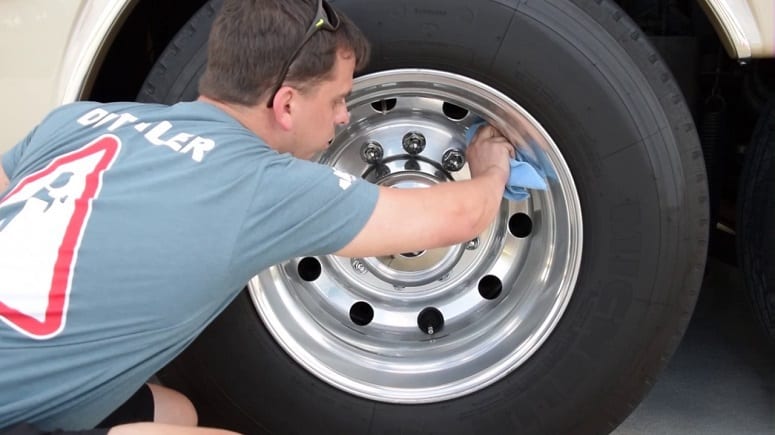
To keep your tires ready for another season, it’s essential that you keep them properly inflated. Insufficient air can cause damage to the tires and rims, so check your pressure pre-storage.
Additionally, you might want to invest in a tire cover to provide some extra protection while you are away.
#10 Condition The Engine
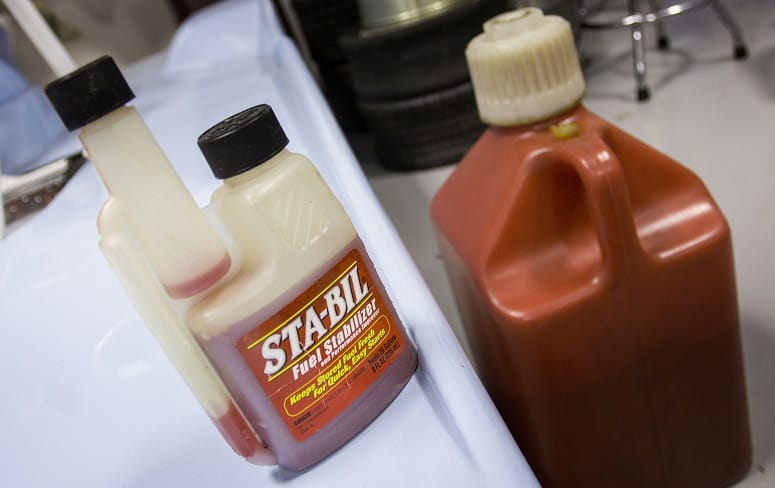
Keep your engine safe by changing the oil and maintaining all operating fluids.
A good tip to save your gas and engine is to add a fuel stabilizer.
When you leave gas in the RV for long periods it could begin to oxidize and eventually cause damage to the engine.
#11 Cover Your RV
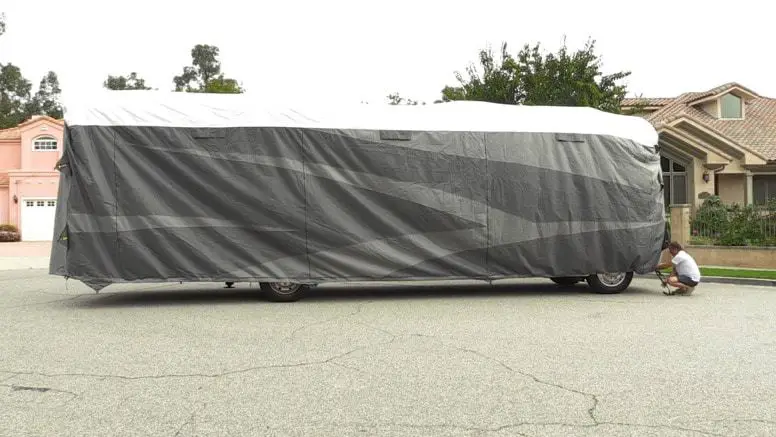
Keep the exterior protected by placing a cover over your RV.
This is a good last step to take before leaving your motorhome in the storage.
Covers will protect from both UV light and rainy weather. A cover will keep your RV looking good for longer by minimizing wear on the exterior.
If you don’t want to buy a full cover, at least get one that will cover the air conditioning units. An air conditioner can be pricey to replace, and rain or frost can cause extensive damage.
You should also look for exterior vent covers. You can use these for your water heater, furnace, and refrigerator exhausts. This will also prevent rodents or insects from invading and building nests.
Look for RV approved covers. The best cover to choose is one made from breathable material.
This will restrict moisture from building up inside and creating mold.
Never cover any vents or exhausts with fine mesh or heavy materials.
If you can’t find a cover for the exhausts, you can tape them over while your RV is in storage. Just remember to remove it before using the RV again.
If you’re worried about invading insects, there are plenty of electronic devices that work specifically to keep rodents away. You could also place ant or roach traps inside just as a precaution, but be aware that these also attract the pests.
#12 Lock Your RV
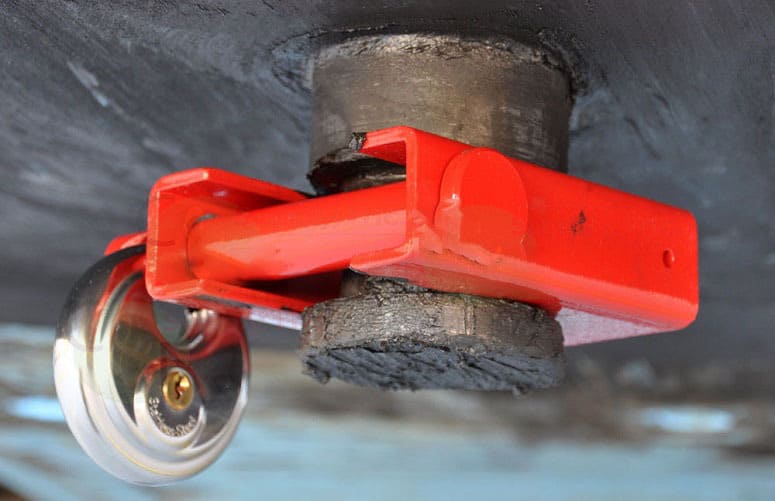
Regardless of the security measures at your chosen storage facility, you should still take some steps to keep your RV secured.
For fifth wheel trailers, get yourself a kingpin or cable-style lock, and for travel trailers, look for a hitch lock. Both of these will hinder any hitch from going over the ball.
They will clamp onto the coupler and make it impossible to hitch. You can also go the extra mile and change the locks on your RV.
If you look at your key, and it says “CH751,” this means that it’s a standard key and it might be easier for people to open it. It saves manufacturers and salesmen a lot of time and money, but it could get costly for you.
#13 Monthly Check-Up
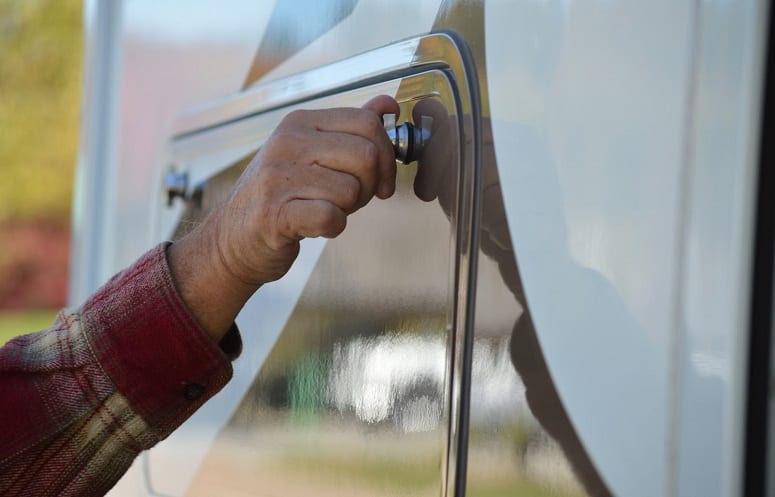
If possible, check on your RV once in a while. This can help you discover any damage in the early stages and save you some money on repairs.
When you go, look for signs of rodents chewing through wires or the undercarriage. Check for intruding water inside your RV through cracks and crevices. And make sure that everything is still intact.
Double check all doors, windows, and vents and ensure they are still locked and secured. And perhaps give everything a quick dust down. Remember that all you do now will keep your RV running for longer and save you money.
#14 Insurance
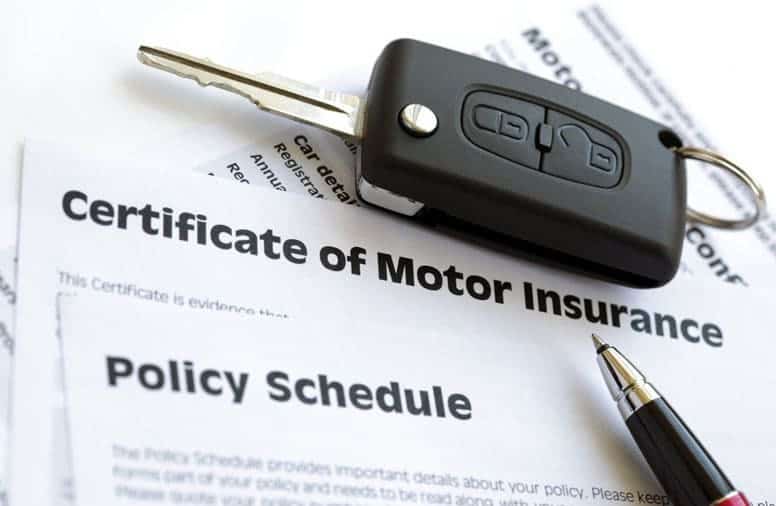
Insurance is essential, even while your RV is in storage.
Many owners opt for getting an insurance policy that covers their vehicle and RV. This might even give you a multi-vehicle discount, how’s that for a money-saving tip?
That said, you want to be sure that your chosen insurance company provides the exact coverage you need for an RV. Look for those that specialize in RV insurance.
To save extra money, ask your insurance company for any discounts during storage. Perhaps discuss with them the security provided by the storage facility, or any extra security that you added.
And let them know if your RV will stay covered or not.
This does, of course, depend on your chosen company and your RV, but if you get lucky, it could save you a decent amount of money.
All In All…
Storing your RV eventually becomes necessary, even if you go full-time. But since your RV was already a pricey investment, it’s nice to save some money on storage. We hope that you found this list of money-saving tips helpful.
Remember to find the storage solution which is suitable for you and your RV.
Next, be sure that you prep your RV for storage by cleaning it inside and out, removing food and goods, locking it, and covering it up.
If you have any further tips and ideas please feel free to tell us in the section below, and keep the tips rolling by sharing this with your friends.


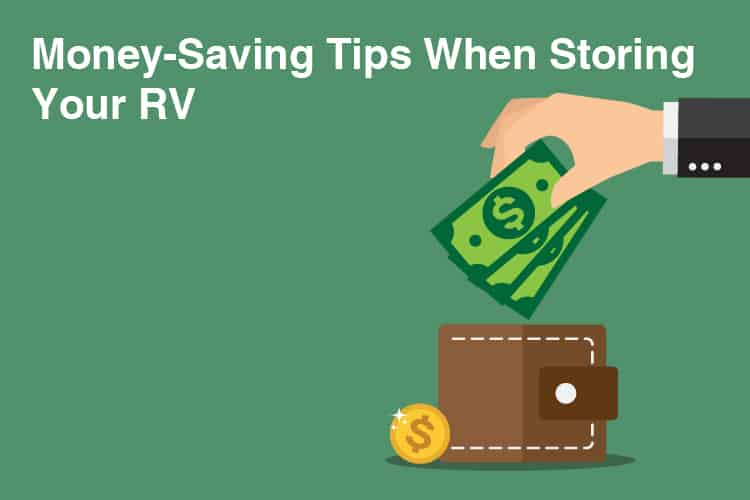
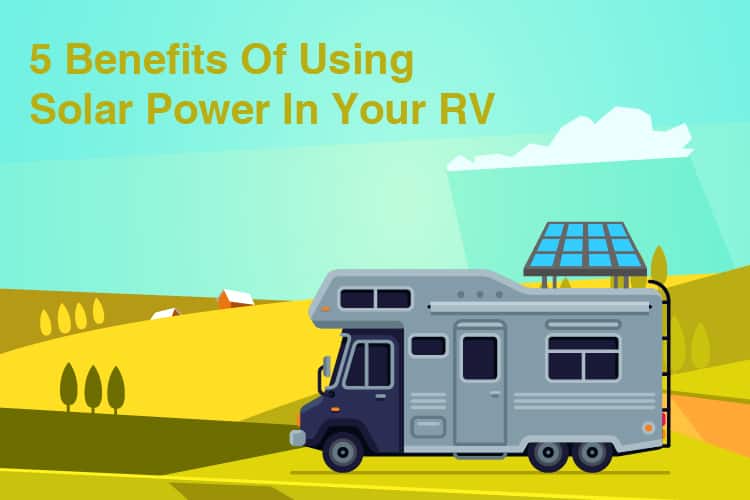
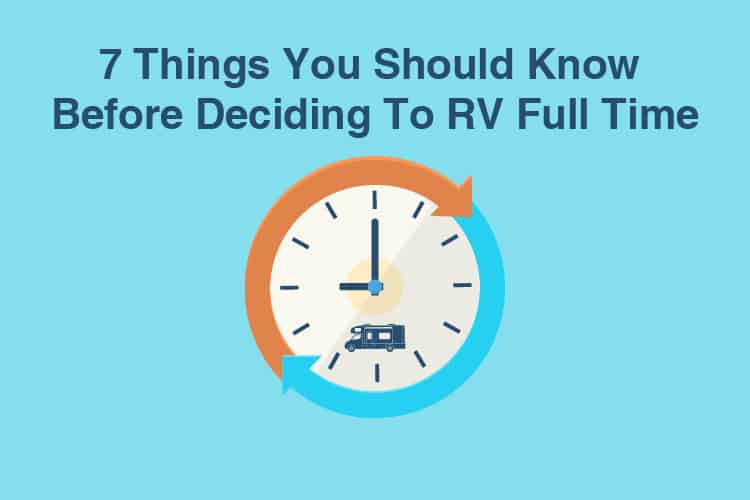
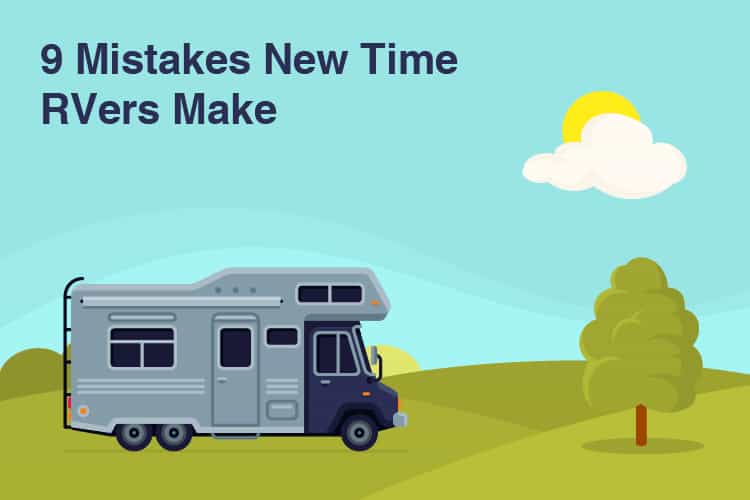
I found it interesting when you said you can buy a tire cover to protect your tires as well as keeping your tires at the right pressure. My uncle just got a new RV and needs a place to get it stored for winter. I’ll have to show him this so he can look for a good storage place to put it.
I have a wooden deck RV and I am thinking about putting a long lasting canopy over the deck. Is there any types that I can use to cover it through the winter particularly since the cover will never again have the option to descended over the entryway side of the camper?